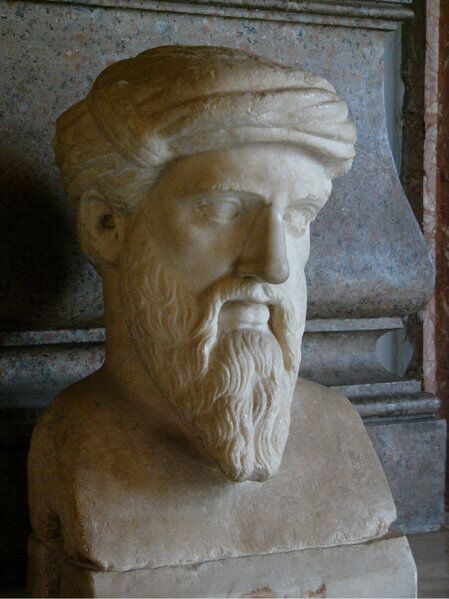Pitagora frasi celebri
Frasi sulla vita di Pitagora
8, 8
Citato in Diogene Laerzio, Vite dei filosofi
Origine: Citato in Porfirio, De abstinentia, traduzione di Roberto Pomelli, in AA. VV., L'anima degli animali, Einaudi, 2015, p. 411. ISBN 978-88-06-21101-1
Frasi sugli uomini di Pitagora
“Tu conoscerai che gli uomini, quando sono sventurati, subiscono le sventure che si sono scelte.”
12, p. 311
Citato in Giamblico, Summa pitagorica
Attribuite
Origine: Citato in Steven Rosen, Il vegetarismo e le religioni del mondo, traduzione di Giulia Amici, Jackson Libri, 1995, p. 130. ISBN 88-256-0826-8 (La polemica pitagorica contro le uccisioni di animali è in funzione apologetica del vegetarianismo, di cui Pitagora è considerato l'iniziatore in Occidente; cfr. Pitagora e Scuola pitagorica su Wikipedia)
11, pp. 309-311
Citato in Giamblico, Summa pitagorica
Pitagora Frasi e Citazioni

Attribuite
Origine: Citato in Enrico Mayer, Frammenti di un viaggio pedagogico, M. Cellini e C., Firenze, 1867, p. 82.

8, 23
Citato in Diogene Laerzio, Vite dei filosofi
8, 33
Citato in Diogene Laerzio, Vite dei filosofi
“Non da qualunque legno si può levare un Mercurio.”
Origine: Citato in Apuleio, Apologia; citato in Giuseppe Fumagalli, Chi l'ha detto?, U. Hoepli, Milano, 1921, p. 62.
13, pp. 311-313
Citato in Giamblico, Summa pitagorica
“Fanciullezza venti anni, adolescenza venti, giovinezza venti, vecchiaia venti.”
8, 10
Citato in Diogene Laerzio, Vite dei filosofi
“Né bisogna giurare per gli dèi; bisogna, infatti, cercare di rendere se stesso degno di fede.”
8, 22
Citato in Diogene Laerzio, Vite dei filosofi
8, 23
Citato in Diogene Laerzio, Vite dei filosofi
34, p. 103
Citato in Giamblico, Summa pitagorica
14, pp. 313-315
Citato in Giamblico, Summa pitagorica
10, p. 309
Citato in Giamblico, Summa pitagorica
144, p. 191
Citato in Giamblico, Summa pitagorica
55, p. 117
Citato in Giamblico, Summa pitagorica
13, p. 313
Citato in Giamblico, Summa pitagorica
8, 36
Citato in Diogene Laerzio, Vite dei filosofi
Pitagora: Frasi in inglese
“Anger begins in folly, and ends in repentance.”
As quoted in Treasury of Thought: Forming an Encyclopædia of Quotations from Ancient and Modern Authors (1894) by Maturin Murray Ballou
“In this theater of man's life it is reserved only for God and angels to be lookers on.”
Francis Bacon, in The Advancement of Learning (1605) Book II, xx, 8.
Misattributed
As quoted in A Dictionary of Thoughts: Being a Cyclopedia of Laconic Quotations from the Best Authors of the World, both Ancient and Modern (1908) by Tyron Edwards, p. 592
“Take not thine enemy for thy friend; nor thy friend for thine enemy!”
The Sayings of the Wise (1555)
“I was Euphorbus at the siege of Troy.”
As reported by Heraclides Ponticus (c. 360 BC), and Diogenes Laërtius (Lives and Opinions of Eminent Philosophers, "Pythagoras", Sect. 4), and quoted in Cosmic Optimism: A Study of the Interpretation of Evolution (1949) by Frederick William Conner
Misquoted as "I was at Euphorbus at the siege of Troy." in Hoyt's New Cyclopedia of Practical Quotations (1922)
“Dear youths, I warn you cherish peace divine,
And in your hearts lay deep these words of mine.”
As reported by Heraclides, son of Sarapion, and Diogenes Laërtius, in Lives and Opinions of Eminent Philosophers, "Pythagoras", Sect. 7, in the translation of C. D. Yonge (1853)
“If thy fellows hurt thee in small things, suffer it! and be as bold with them!”
The Sayings of the Wise (1555)
“Write in the sand the flaws of your friend.”
As quoted in Geary's Guide to the World's Great Aphorists (2007) by James Geary
"Pythagorean Ethical Sentences From Stobæus" (1904)
Florilegium
As reported by Alexander Polyhistor, and Diogenes Laërtius in Lives and Opinions of Eminent Philosophers, "Pythagoras", Sect. 30, in the translation of C. D. Yonge (1853)
“A blow from your friend is better than a kiss from your enemy.”
As quoted in Geary's Guide to the World's Great Aphorists (2007) by James Geary, p. 118
The Sayings of the Wise (1555)
“Do not even think of doing what ought not to be done.”
"Pythagorean Ethical Sentences From Stobæus" (1904)
Florilegium
“Sobriety is the strength of the soul, for it preserves its reason unclouded by passion.”
As quoted in The History of Philosophy: From the Earliest Times to the Beginning of the Present Century (1819) by William Enfield
Sobriety is the strength of the mind; for it preserves reason unclouded by passion.
As quoted in Bible of Reason (1831) by Benjamin F. Powell, p. 157
Strength of mind rests in sobriety; for this keeps your reason unclouded by passion.
As quoted in Dictionary of Quotations from Ancient and Modern English and Foreign Sources (1899) by James Wood
"Pythagorean Ethical Sentences From Stobæus" (1904)
Florilegium
"Pythagorean Ethical Sentences From Stobæus" (1904)
Florilegium
“None can be free who is a slave to, and ruled by, his passions.”
As quoted in Florilegium, XVIII, 23, as translated in Dictionary of Quotations (1906) by Thomas Benfield Harbottle, p. 368
No one is free who has not obtained the empire of himself.
As translated by Nicholas Rowe(1732)
No man is free who cannot command himself.
As quoted in Moral Encyclopaedia, Or, Varlé's Self-instructor, No. 3 (1831) by by Charles Varle
No man is free who cannot control himself.
As quoted in 25 Days to Better Thinking and Better Living: A Guide for Improving Every Aspect of Your Life (2006) by Linda Elder and Richard Paul
Florilegium
“Wind indeed increases fire, but custom love.”
"Pythagorean Ethical Sentences From Stobæus" (1904)
Florilegium
The Sayings of the Wise (1555)
“There is nothing so easy but that it becomes difficult when you do it reluctantly.”
Terence, in Heauton Timoroumenos [The Self-Tormentor]
Misattributed
As quoted in Gems of Thought: Being a Collection of More Than a Thousand Choice Selections, Or Aphorisms, from Nearly Four Hundred and Fifty Different Authors, and on One Hundred and Forty Different Subjects (1888). p. 97 by Charles Northend
As quoted in Divine Harmony: The Life and Teachings of Pythagoras by John Strohmeier and Peter Westbrook. (1999)
The Golden Verses
